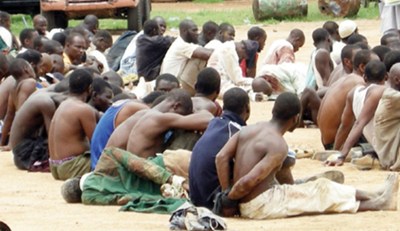The first verdict involving terrorism in a Nigerian court was handed out yesterday when a Federal High Court in Abuja led by Justice Bilkisu Aliyu slammed life imprisonment sentences on four members of the Boko Haram terrorist group.
It also handed 10 years’ jail term to one of the accused persons, Umar Ibrahim, and freed another accused, Musa Adamu, for lack of evidence.
In her judgement yesterday, Justice Aliyu convicted the five accused persons for their involvement in the Suleja and Nasarawa bombings that led to the death of many people.
Those sentenced to life imprisonment are Shuaibu Abubakar, Salisu Ahmed, Umar Babagana-Umar and Mohamed Ali.
Justice Aliyu also exonerated the convicts on the charges relating to the explosions at the All Christians Fellowship and the killing of policemen in Dakina on the grounds that the prosecution failed to provide convincing evidence to support the charges.
The judge further held that, in regards to other charges, the prosecution led sufficient evidence to prove the guilt of the convicts.
Justice Aliyu held that she was convinced without reasonable doubt that the four accused persons whom she sentenced to life imprisonment indeed “used explosives meant for blasting rocks for mining purposes to kill human beings who had done nothing against them”.
She said, “Human life is sacred. There is no human life that is more sacred than the other. The convicts have shown lack of respect for human life. They deserve to be removed from the society.”
In respect of Umar Ibrahim, who got 10 years, the judge observed that by the evidence led by the prosecution, he merely served as an errand boy for others who engaged in the illegal weapon training. Justice Aliyu held that Ibrahim was culpable for aiding the illegal trainees as he could have refused to run errand for them if he was not in support of their activities.
The six were first arraigned on a five-count charge in 2011 and charged with the April 8, 2011, bombing of the Independent National Electoral Commission (INEC) office in Suleja, Niger State, where 16 people died and others were injured.
They were also charged with the July 10, 2011, explosions at the All Christians Fellowship, Suleja, killing three and injuring others; the March 3, 2011 explosion at a political rally in Suleja, where three people died; and the May 23, 2011 explosion in Dakina village, Bwuari, Abuja, killing three policemen.
They were also charged with engaging in illegal training in weapon handling and unlawful possession of weapon for the purpose of engaging in terrorism.
They were charged under Section 15(2) and (3) of the Economic and Financial Crimes (EFCC) Act.
The State Security Service (SSS) had, through its spokesperson Marylyn Ogar, told the world before the arraignment that the six suspects had confessed to taking part in the April 8, 2011, bombing of the INEC office in Suleja, and the July 10, 2011, bombing of the All Christian Fellowship Church also in Suleja, Niger State.
They were also said to have confessed to the killing of four policemen at a checkpoint at Dakwa-Deidei in Bwari Area Council of the federal capital on May 22, 2011.
Among the six suspects were a Niger Republic national and a 31-year-old man from Imo State who converted to Islam in 2003. Others include two accomplices from Borno and Kano states.
Also arrested was a miner from Nasarawa State alleged to be the supplier of explosive materials to the group.
A decrepit two-room building located at a slum at Hayin-Uku in Tafa local government area of Niger State was identified as the location where improvised explosive devices were assembled by the suspects.
A detachment of SSS operatives had raided the building on a Saturday and various explosive items and devices were recovered. Some of the items recovered include gas cylinders, bomb detonators, locally made revolver, metallic filters primed for bombing and two laptop computers.
Other items recovered were ceiling fan coil, metallic cylinders, nine-volt batteries ready for use, 200 pieces of detonators, detonating cables, battery chargers, 10 GSM handsets with SIM cards and a Honda Civic car with Borno State registration number AG 94 MNG, among others.
The sentencing has already attracted positive comments from prominent lawyers across the nation
A constitutional lawyer, Prof. ItseSagay (SAN), said the judgement would help stem the tide of impunity and wanton killings in the country.
Sagay said, “It is a welcome development which will bring the incessant mass killings, particularly in the north, to an end.
“This is an exceptional case in which the state has finally restored order and authority because people believe that they can kill for any reason and get away with it.”
Also, Mr Joseph Otteh, executive director, Access to Justice, a human rights group, said the judgement was a timely judicial response to the upsurge of terrorism.
“In some ways, it is a vindication of the rule of law and it will dissuade the use of terrorist tactics to fight ideological causes,” he said.
For his part, Mr Wale Ogunade, president, Voters Awareness Initiative, a non-governmental organisation, lauded the quick conclusion of the trial.
Ogunade said, “We have always clamoured for quick dispensation of justice because we believe that justice delayed is justice denied.”



Leave a Reply